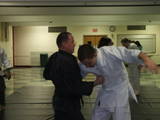Every once in a while I have someone come in wishing to teach them or their children so they can “learn discipline”. Most of the time, they leave with another martial arts myth removed from their database.
I say this because things aren’t done the way they are viewed in the movies. We don’t exist in a feudal society with perpetual civil wars that require constant training in armed and unarmed forms of combat. We aren’t in a situation that requires us to train hour upon hour, day upon day, in order to defend our daimyo’s lands from the army of the warlord on the other side of the mountain. Even for those of us that train for personal defense, it very simply is not the same world.
There was a whole different meaning to the word “discipline” in those days. Quite simply, you trained as hard as you could as best you could as much as you could because to do less would result in your death on the battlefield. It was your side against the other side with archers, spearmen, swordsmen and later, riflemen. Just like today’s wars, there’s a whole lot more going on than what we will ever encounter walking to our car after work. Don’t get me wrong! An attack on the street is every bit as dangerous and the situations just as deadly. The difference is, though, that this is the anomoly. We need to be aware but in all likelihood, if we are very fortunate, we will never put our skills to use in a life-and-death situation.
Let’s time-warp forward a few centuries, now. It’s the early 1900’s and we’re observing a “traditional” martial arts class in Japan. The head instructor enters the front door along with a number of his senior students. Those on the training floor stop what they are doing and, on command, bow to the instructor. As the instructor goes by a junior student asks him if he is having a nice day. The instructor only marginally acknowledges the greeting but as he passes, one of the seniors knocks the student to the ground with a brutal punch. The crime? The student is not supposed to address the instructor at all, much less in such informal terms. 
Now I have to ask you: Is this the kind of treatment you’d expect to have your children subjected to in a class setting?
Let me answer for you: No! This is the kind of thing over which cheezy personal injury lawyers salivate. It isn’t the kind of behavior we tolerate in today’s society.
And saying it’s teaching discipline is a lie. It’s abusive behavior.
So am I saying we’re supposed to reduce our martial arts training to giggly pillow fights? Nobody gets bruised, we don’t keep score and everybody goes home a winner? Absolutely not! We train hard in our dojo. We smack each other around with solid, but controlled, strikes and kicks. We throw each other to the ground but we control our partner’s descent so that they can land properly. We leave sore, sweaty and sometimes with fresh bruises. The difference is that we acknowledge to each other – and ourselves – that we’re going to subject ourselves to a couple hours of this a few days a week. We not only know it is coming, we expect it. We can even go so far as to say we look forward to it.
Our “discipline” doesn’t come from the physical activity….. at least not directly. It comes from showing up every class knowing what’s in store for us. It comes from showing up on days we really would like to just go home and have a cold one instead. It comes from showing up when we’re already tired, when we’re irritated from a lousy day at work, when we have to go from the car to the dojo in the rain and so on.
Our discipline comes from practicing the same kihon for incalculable repititions because we know we can still do it better. It comes from knowing we’re going to practice our new kata over and over and over to the point where we can do it in our sleep. It comes from knowing that once we now know the directions to turn and the techniques to execute we will spend the rest of our lives learning and practicing the applications of the techniques in that form. It comes from knowing we’re never done and that once we “get” a kata, our reward is to begin learning a new one and the process begins anew. Nothing is ever completed. Constant review and refinement is expected. And through all of this, we do it because we know it’s what’s necessary, not because we’ll get beaten otherwise.
Can we learn discipline from martial arts in today’s world? Sure. The trick is that we become our own teacher, and quite often, we find it was there all the time. For those that leave because it’s too hard or too far or too (fill in the blank) it likely would never come, regardless of efforts of the instructors.
This article is written with one of my students particularly in mind. He leaves in a few weeks to begin serving our country in the military. For several years he has made a monumental effort to get to and from class. His trip covers roughly two hours on mass transit and a two mile walk from the station to the dojo. The same trip is necessary to get home. He has come to class in our ridiculously hot, humid summers, in sub-freezing winter weather, in show, in rain and whatever else nature has thrown at him. No complaints (not many, anyway) or excuses. He gets there and he works hard.
That, ladies and gentlemen, is discipline.